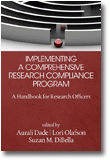
Implementing a Comprehensive Research Compliance Program
A Handbook for Research Officers
Edited by:
Aurali Dade, George Mason University
Lori Olafson, University of Nevada, Las Vegas
Suzan M. DiBella, University of Nevada, Las Vegas
Published 2015
The senior research compliance administrator has emerged as a critically important position as universities and other research organizations face an increasingly intricate regulatory environment. These administrators are tasked with a special challenge: ensuring that their institutions conduct safe, ethical, and compliant research while also helping researchers understand and meet compliance requirements and achieve their research goals. These competing responsibilities can make the role of the research administrator complex; however, those who serve in this role may find that they have limited preparation for the challenges and little or no formal education in the field.
Thus, the goal of this handbook is to provide practical guidance to research administrators who are responsible for a wide variety of compliance programs. Previous volumes on these topics have focused primarily on educating research faculty, staff, and students. An assumption in many of these handbooks is that all additional questions related to research ethics and regulations should be directed to the senior research administrator; yet, the books have limited guidance intended for the senior research administrators themselves. This handbook is designed, therefore, to serve as a detailed program implementation manual for these administrators, who are expected to be conversant on a broad range of complex ethical and regulatory topics and to provide guidance to those conducting research, as well as upper administration and others interested in safe, ethical, and compliant research.
CONTENTS
Preface. Introduction, Aurali Dade and Lori Olafson. PART I: RESEARCH SUBJECT PROTECTION. Human Research Protection Programs, Melissa A. Epstein and Steven Lascher. Animal Care and Use, Roger Van Andel. PART II: RESEARCH INTEGRITY. Building a Responsible Conduct of Research Program to Sustain an Institutional Culture of Research Integrity and Compliance, Debra Schaller-Demers. Research Misconduct Programs and the Role of the Research Integrity Officer, Elizabeth A. Boyd. Conflicts of Interest and Commitment in Research, Aurali Dade, Lori Olafson, and Nancy Moody. Navigating the Gray Areas of Scientific Work: Questionable Research Practices and Training in the Responsible Conduct of Research, Alison L. Antes. Training, Transparency, and Trust: Fostering Research Integrity and Compliance in Graduate Education, Kathryn Hausbeck Korgan. PART III: REGULATORY/LEGAL ISSUES. Compliance Issues in International Research and International Research Collaborations, Elizabeth Duggins Peloso, Artemis Velahos Koch, and Jorge Canovas. Export Compliance and Secure Research, David A. Brady, Elizabeth Duggins Peloso, and Gretta N. Rowold. Introduction to Technology Transfer and Commercialization, Zachary Miles and Bryan Ritchie. PART IV: ENVIRONMENTAL HEALTH AND SAFETY. Environmental Health and Safety, Laura Lee Duckworth and Julie A. Zobel. Chemical and Biological Laboratory Safety, Julie Zobel and Aurali Dade. Radiation Safety, Amy B. Orders. PART V: RELATED COMPLIANCE ISSUES. Postaward Financial Compliance and Administration, R. David Paul. Managing Nepotism in Sponsored Research, Rochelle R. Athey. Data Management, Andrew L. Sallans and Richard J. Patterson. PART VI: RESOURCES IN RESEARCH ADMINISTRATION. Creating a Culture of Compliance: The Role of the Vice President for Research, Mark J. Rudin. Developing Expertise as a Research Administrator, Lori Olafson and Gregory Schraw. Communication Issues in Research Administration, Suzan M. DiBella. About the Editors, About the Contributors.
-
Paperback978-1-68123-131-0
Web price: $62.04 (Reg. 72.99)
-
Hardcover978-1-68123-132-7
Web price: $89.24 (Reg. 104.99)
- eBook978-1-68123-133-4

- EDU000000 - EDUCATION: General
- BUS085000 - BUSINESS & ECONOMICS: Organizational Behavior
- EDU001010 - EDUCATION: ADMINISTRATION: Facility Management
-
 Dark and Destructive Leadership
Dark and Destructive Leadership
-
 Distance Learning
Volume 20 #4
Distance Learning
Volume 20 #4
-
 Distance Learning
Volume 20 #1
Distance Learning
Volume 20 #1
-
 Distance Learning
Volume 20 #3
Distance Learning
Volume 20 #3
-
 Lift Every Voice
Radford University Teacher Education Students
Lift Every Voice
Radford University Teacher Education Students
-
 Rekindling Embers of the Soul
An Examination of Spirituality Issues Relating to Teacher Education
Rekindling Embers of the Soul
An Examination of Spirituality Issues Relating to Teacher Education
-
 Socio-Economic Approach to Management Treatise
Theory and Practices
Socio-Economic Approach to Management Treatise
Theory and Practices

